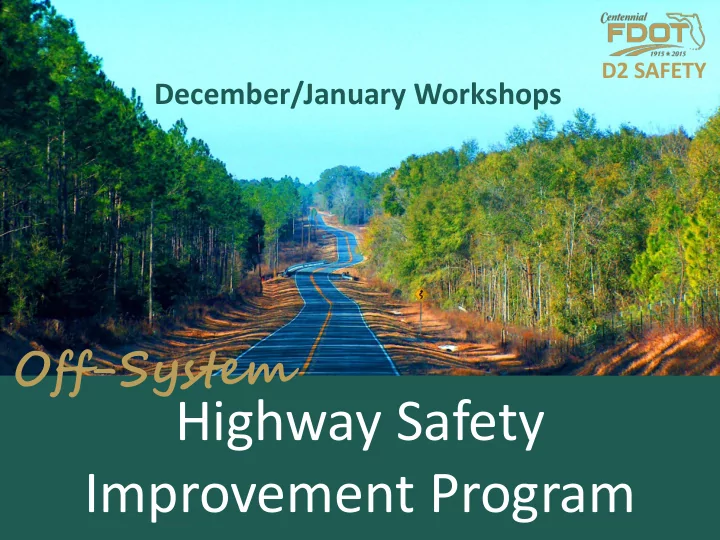

D2 SAFETY December/January Workshops Off-System Highway Safety Improvement Program
Agenda Highway Safety Improvement Program (HSIP) Moving Ahead for Progress in the 21st Century (MAP-21) Strategic Highway Safety Plan (SHSP) Application Process – Example Eligible Projects – Local Agency Safety Team (LAST) – Project Programming and Delivery Timeline
Highway Safety Improvement Program (HSIP)
Highway Safety Improvement Program (HSIP) Strategic safety planning Federally-funded, state administered Data-driven roadway safety management process Highway safety improvement projects
History 1966 Highway Safety 1960s 1970s 1973 Highway Safety Act 1980s 1990s TEA-21, 1998 2000s SAFETEA-LU, 2005 2010s MAP-21, 2012
Moving Ahead for Progress in the 21st Century (MAP-21)
MAP-21 Data driven strategic approach Lump sum funding vs. individual authorizations Road user defined Strategic Highway Safety Plans (SHSP) 5% reports
Strategic Highway Safety Plan
Strategic Highway Safety Plans (SHSPs) Vision, Mission and Goals Transportation safety needs Safety Strategies Performance Measures Development, Implementation and Update
Florida SHSP Emphasis Areas Aggressive Driving At Risk – Teen Drivers – Aging Road Users Distracted Driving Impaired Driving Intersection Crashes Lane Departure Crashes Traffic Data Vulnerable Road Users – Bicyclists and Pedestrians – Motorcyclists
Application Process
Introducing
Requirements and Restrictions Data-driven and evidence based forecasted safety improvements Projects intended to address: Capacity enhancement Beautification Economic development Drainage Railroad quiet zone Bridge needs Maintenance (Annual)
HSIP Basic Process Project Preliminary HSIP Funding Identification Analysis Request Project Delivery Programming Evaluation
Project Identification Key elements: 1. How was the issue identified? Jurisdiction-wide safety analysis Corridor Safety Analysis/Road Safety Assessment Spot-Location Safety Analysis/Road Safety Assessment Community or Regional Planning Process Stakeholder, Community or Outside Specialists Other Transportation Stakeholders 2. Is the project focused primarily on “spot location(s)” or “systemic” improvements? 3. Limited to 5000 characters
Existing Conditions Shoulder Grade Key elements: Roadway Type Traffic Data Shoulder Type Limitations and Constraints
Preliminary Safety Analysis 5-Years Crash Data (2010 – 2014) Prior attempts to address the Safety Issue Countermeasure Selection Proposed Improvement/Concept Description Potential for Proposed Improvements to Address the Safety Issue
Example Eligible Projects http://safety.fhwa.dot.gov/provencountermeasures/
Pavement markings Oversized Signs Street lights Intersection Crashes
Turn restrictions One signal head per lane New alignment Backplates Turn markings Intersection Crashes
Access management Splitter islands Close driveways Turn lanes Intersection Crashes
Safety Edge Paved Shoulders Centerline/Edgeline Rumble Strips Lane Departure Crashes
Guardrail Enhanced Delineation for Horizontal Curves Lane Departure Crashes
Hybrid Beacon Pedestrian Island Pedestrian Countdown Signal aka HAWK Improved Pedestrian Features Vulnerable Road Users
Local Agency Safety Team
Responsibilities and Duties Assistance Preliminary Application Review Application Completion Recommendations for funding Lake Mary Office considerations Julio Alegre, P.E., PTOE (407) 644-1898 Coordinate with non-funded project applicants for one (1) julio.alegre@metriceng.com year for consideration in the next year cycle. Jacksonville Office Holly Walker, P.E., CPM (904) 260-1567 The LAST does not replace an holly.walker@metriceng.com agency’s existing engineering staff or consultant on contract.
Application Completion Qualitative assessment/field review Constructability/feasibility review Update or provide improvement concept Calculate improvement cost estimate using FDOT construction costs. Develop project scope Develop economic analysis (benefit/cost and net present value) – B/C > 2.0 and NPV > 0 – Use Crash Modification Factors from FHWA CMF Clearinghouse www.cmfclearinghouse.org
HSIP Basic Process Project Preliminary HSIP Funding Identification Analysis Request Project Delivery Programming Evaluation
HSIP Basic Process Project Preliminary HSIP Funding Identification Analysis Request Project Delivery Programming Evaluation Local Agencies Department LAST
Project Programming and Delivery
Programming The Work Program includes all proposed project commitments classified by major program and appropriation category. Planning Project Development and Environment (PD&E) Design Right-of-Way Acquisition Construction
Delivery Method The Local Agency Program (LAP) is the Department's primary delivery mechanism for off-system projects included in the Five-Year Adopted Work Program, as opposed to the Florida Department of Transportation (the Department) administering the off-system project. Program Management Bulletin 15-03
2015-2016 HSIP Timeline
Workshops December 7, 2015 – 10:00 a.m. State Materials Office, Gainesville December 7, 2015 – 2:00 p.m. FDOT District Office, Lake City December 14, 2015 – 10:00 a.m. Urban Office Training Facility, Jacksonville December 14, 2015 – 2:00 p.m. Maintenance Crew Building, St. Augustine January 13, 2016 – 10:00 a.m. Community Center, Mayo Call for Projects January – February 2016 March 1, 2016 – Project Deadline
Jeff Scott, P.E. FDOT Project Manager District Safety Engineer (904) 360-5644 jeffrey.scott@dot.state.fl.us Questions? HSIP Program Contacts Julio Alegre, P.E., PTOE Holly Walker, P.E., CPM Metric Engineering - Lake Mary Metric Engineering - Jacksonville (407) 644-1898 (904) 260-1567 julio.alegre@metriceng.com holly.walker@metriceng.com
Recommend
More recommend